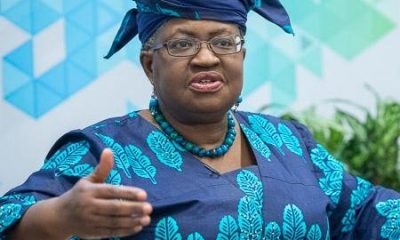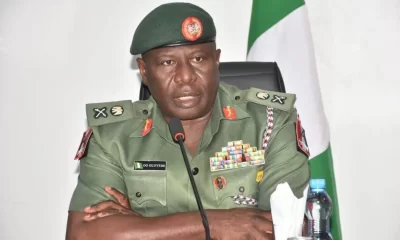Featured
End Of Road For Atiku, Obi, As S’Court Affirms Tinubu’s Election …Dismisses PDP, LP’s Appeals
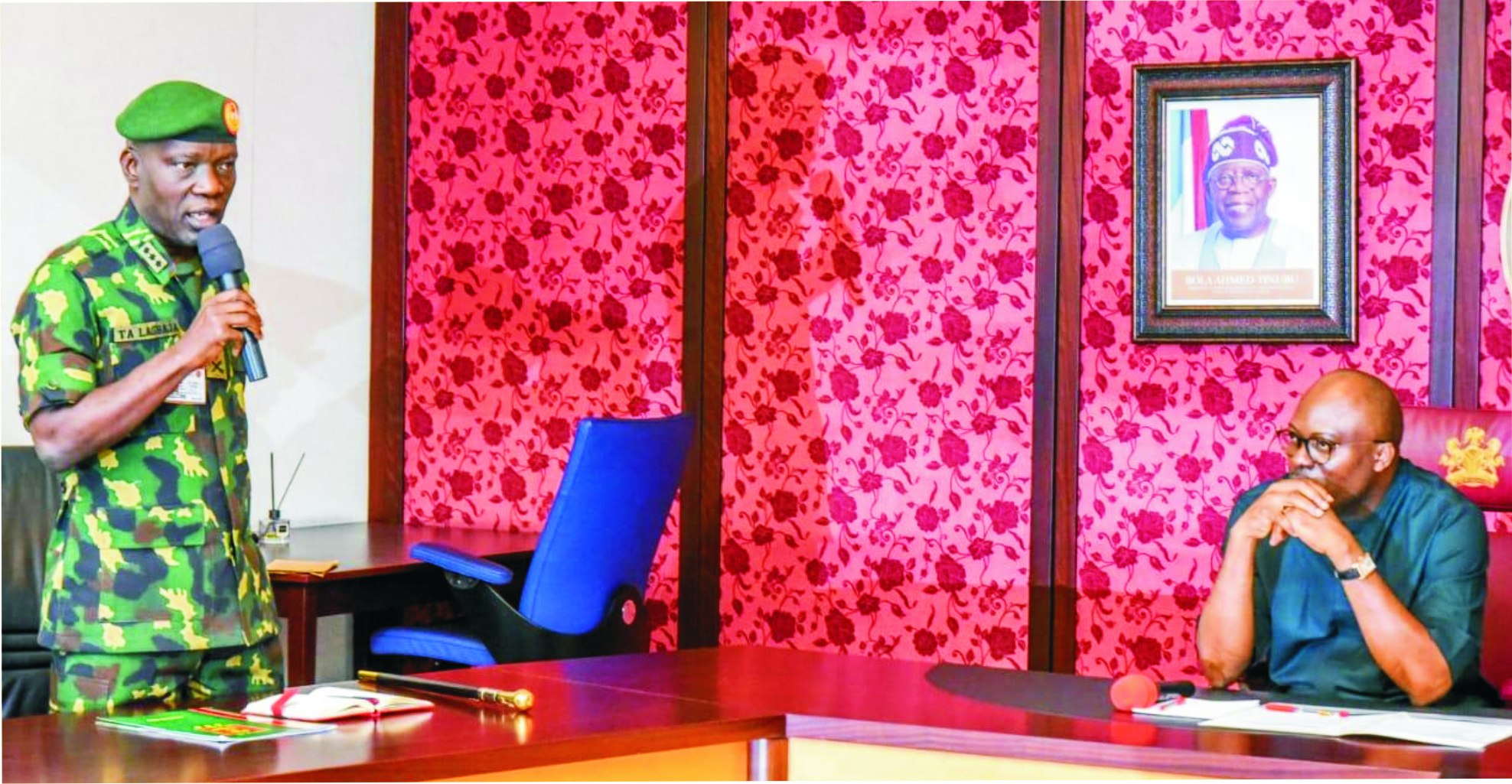
The Supreme Court yesterday affirmed President Bola Tinubu of the All Progressives Congress (APC) as the valid winner of the presidential election that held in the country on February 25, 2023.
The apex court, in a unanimous decision by a seven-member panel of Justices, held that there was no merit in the petition that a former Vice President and candidate of the Peoples Democratic Party (PDP), Alhaji Atiku Abubakar, filed to nullify the outcome of the election.
The seven Justices also unanimously dismissed the appeal filed by the presidential candidate of the Labour Party, Peter Obi, for lack of merit.
The seven-member panel led by its chairman, Justice John Inyang Okoro, include Justices Uwani Aji, Mohammed Garba, Ibrahim Saulawa, Adamu Jauro, Abubakar Tijjani and Emmanuel Agim.
In its lead judgment that was prepared and read by Justice Okoro, the Supreme Court held that Atiku did not prove that the Independent National Electoral Commission (INEC), did not substantially comply with provisions of the Electoral Act, in the conduct of the election.
The apex court held that section 185(1) of the Evidence Act provided that an election should not be liable to be invalidated, when alleged non compliance did not substantially affect the outcome of an election.
It held that evidence contained in the record of the appeal showed that the Appellants abandoned the duty imposed on them by the law to not only prove the alleged non compliance, but to establish that the failure of INEC to transmit results of the election through its Result Viewing Portal (IReV) influenced the outcome of the presidential poll.
The Supreme Court said it had in past judgements, made it clear that there was a difference between election result collation system and the IReV portal.
It, therefore, ruled that the failure of the INEC to transmit the election results on the IReV Portal did not affect the outcome of the election.
“Where the IReV portal fails, it does not stop the collation which up till the last election was manually done,” the court held.
It further held that the unavailability of results on INEC’s IReV portal “for whatever reason, could not be the reason for an election to be nullified”.
Okoro said, “When IReV fails, it does not stop the collation of the results. It deprives people of viewing results. The non-function will affect the trust of the electorates in the election.
“Unavailability of IReV cannot be a ground for the election to be nullified.
“The failure did not affect the outcome of the election. The issue is resolved against the appellants.”
Nevertheless, it stressed that INEC’s failure to electronically transmit results of the election denied the electorates the opportunity to follow and cross-check results that were eventually uploaded.
“Truth must be told, the non transmission of results to the IReV portal may also reduce the confidence of the voting population in the electoral process,” the Supreme Court warned.
The apex court also described as misconceived and misplaced, Atiku’s contention that Tinubu ought not have been declared winner of the presidential election, having failed to secure 25% votes in the Federal Capital Territory, FCT, Abuja.
The apex court affirmed the position of the PEPC that the FCT does not have a status that is more special than that of the 36 States of the federation.
According to Justice Okoro, scoring 25% votes in the FCT, Abuja is not mandatory and cannot stop INEC from declaring a presidential candidate who scored the highest number of votes and 25 percent in two-thirds of the States, the winner of the election.
The presiding Justice asked, “Are you saying if someone scores 25% votes in 30 states but not in Abuja, he should not be president? Is that how you interpret the law?
“That is not the law. Supreme Court agrees with the Court of Appeal,” he added.
The apex court also supported the judgment of the tribunal for striking out witnesses of Atiku Abubakar’s testimonies on manipulation in the election, adding that most of the witnesses gave “inadmissible hearsay” evidence
Describing Atiku’s witnesses’ testimonies as “hearsay”, Okoro said, “A political party can’t appoint an octopus agent who will be at every polling unit on election day.
“Atiku’s agents can only testify in their polling units where they witnessed what they saw, but not across the country where they were not present.
“I adopt the decision of the lower court which is in line with a plethora of precedents. The witnesses’ testimonies were hearsay.
“The finding of the lower court in discountenancing the Atiku’s witnesses cannot be faulted.”
He added that “The Appellants did not present any evidence to warrant the interference of the findings of the lower court”.
On the issue that President Tinubu was involved in a drug related case in the USA that led to the forfeiture of $460, 000, the Supreme Court held that Tinubu raised the issue when the Respondents had already filed their process.
It held that the action denied the Respondents the right to fair hearing.
“The ruling of the lower court is unassailable and this court will not interfere,” it held.
The apex court also dismissed the the certificate forgery allegation pleaded against Tinubu by Atiku, saying the court cannot entertain fresh evidence that was not pleaded or presented at the Court of Appeal.
It also held that Atiku and PDP did not prove that they suffered any miscarriage of justice as a result of the dismissal of their petition by the Presidential Election Petition Court (PEPC).
The court held that whereas Atiku alleged that the result that was declared by INEC was not accurate, he, however, failed to put forward their perceived rightful result.
It held that the result announced by INEC was presumed as correct in the absence of “any rival or alternative result.”
“The figure before us shows that the 2nd Respondent won the highest number of votes and was duly declared winner.”
Consequently, the court, resolved all the issues that Atiku raised in his petition, against him.
“On the whole, having resolved all the issues against the Appellants, it is my view that there is no merit in this appeal and it is hereby dismissed.
“Judgement of the lower court delivered on September 6 is hereby affirmed. I shall make no order as to cost,” the Supreme Court held.
The Supreme Court also dismissed as lacking in merit, the appeal the candidate of the Labour Party, Mr. Peter Obi, filed to nullify President Bola Tinubu’s election.
Also in a unanimous decision by a seven-member panel of Justices, the apex court held that Obi’s appeal deserved to be dismissed.
In the lead judgement that was delivered by Justice Okoro, the court held that the issues Obi raised in his case were already decided in a separate appeal that was filed by the PDP candidate, Atiku.
Justice Okoro noted that the only distinct issue that Obi raised in his appeal, was the issue that the Vice President, Kashim Shettima, had double nominations from the APC.
The court held that it had earlier decided the issue on May 26, in an appeal marked: SC/CV/501/2023.
“This court cannot allow the matter to be relitigated in this court. There must be an end to litigation. This matter ought not to have come here.
“The appeal lacks merit and it is accordingly dismissed,” the apex court held.
It will be recalled that INEC had on March 1, announced that Tinubu of the ruling All Progressives Congress, APC, won the presidential contest, ahead of 17 other candidates that participated in the poll.
It declared that he garnered a total of 8,794,726 votes to defeat his two major rivals, Alhaji Atiku Abubakar of the PDP, who came second with a total of 6,984,520 votes, and Mr. Peter Obi of the Labour Party, who came third with a total of 6,101,533 votes.
By: Boye Salau
Featured
Tinubu Commissions Afam 11 Power Plant …Urges Stronger Private Sector Partnership In Power Sector
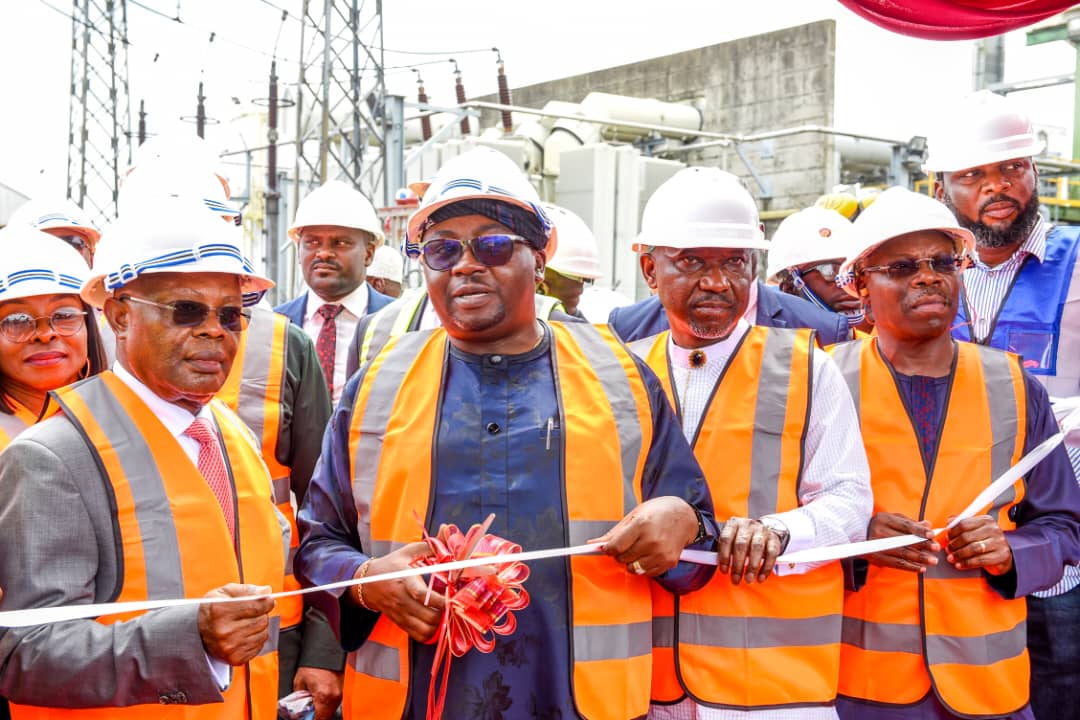
President Bola Tinubu has restated the commitment of the Federal Government towards achieving sustainable electricity supply and industrialisation in Nigeria.
Tinubu gave the declaration during the commissioning of the newly constructed 180 megawatts Afam 11 Power Plant located in Afam, Oyigbo Local Government Area in Rivers State on Wednesday.
He said the completion of the project within just 16 months was a key achievement in the power sector.
The President who addressed Nigerians virtually during the event, emphasized that the project, which is a landmark partnership between Crescendough Nigeria Limited (CNL) and Sahara Power Group, underscored the tenacity of his administration to promote success in private sector partnership and development, adding that the feat will increase industrialisation and economic growth in the country.
The president commended the Rivers State Government, the contractors, Sahara Energies and Crescendough Nigeria Limited (CNL) for the successful delivery of the project on record time.
While urging stronger collaboration among stakeholders to achieve a more globally competitive Nigeria, Tinubu said achieving sustainable power supply remains an unwavering goal under his administration
The President described the project as a testament to the blossoming investment opportunities fostered by his administration’s well-structured policies, which prioritize national development and private sector participation.
He emphasized that the Afam II Plant will not only bolster Nigeria’s power generation capacity by adding 180MW to the national grid but also energize businesses, industries, healthcare facilities, and households, igniting hope for a brighter economic future.
“The completion of the Afam II Plant within just 16 months reinforces our capacity to overcome challenges through collaboration, tenacity, and unwavering commitment under the Renewed Hope Agenda,” President Tinubu stated. “Achieving stable power supply remains a top priority for this administration. I have directed the Honourable Minister of Power and all stakeholders in the power value chain to work collectively towards our declaration to light up Nigeria.”
“We solicit the support of all Nigerians as we implement reforms and strategies to transform the power sector. Our administration will continue to enforce policies that attract investments—both local and foreign—to achieve this critical goal,” he affirmed.
In his remarks, the Administrator of Rivers State, Vice Admiral Ibok-Ete Ibas (Rtd), hailed the project as a product of visionary leadership and private sector empowerment.
He noted that President Tinubu’s enabling policies have spurred bold investments across key sectors, including power, agriculture, oil and gas, education, and transportation.
“This power plant reflects the long-standing vision of successive Rivers State administrations to expand energy infrastructure beyond oil and gas, driving industrial growth,” Vice Admiral Ibas said. “Beyond boosting electricity supply, this project has created jobs and skills development opportunities for youths in Afam. I commend the host community for their cooperation, proving that peace and development go hand in hand,” he said.
The Minister of Power, Adebayo Adelabu, described the Afam II Plant as a commendable milestone showcasing the private sector’s pivotal role in enhancing power generation within a conducive business environment.
Similarly, the Minister of State for Petroleum Resources (Gas), Ekperikpe Ekpo, applauded Rivers State’s sustained investments in energy infrastructure since 2011, culminating in the Afam II Plant’s success.
Speaking at the event, the Group Managing Director of Sahara Power Group, Kola Adesina, highlighted that the partnership reinforces Sahara’s position as Nigeria’s largest private-sector electricity provider, contributing 20% of the nation’s power supply and driving sustainable development.
He described the project as a celebration of collaboration, intentional strategic and sustainable partnership that make Nigeria an industrial hub.
He commended President Tinubu’s Renewed Hope Agenda, while also thanking the host communities for their support.
The Tide reports that the Afam II Power Plant stands as a beacon of progress, underscoring Nigeria’s resolve to achieving energy security, economic growth, and industrial transformation under the Renewed Hope Agenda.
Taneh Beemene
Featured
Tight Security As Muslims Celebrate Eid-el-Kabir, Today

As Muslim faithful celebrate the Eid-el-Kabir today, security agencies, including the Federal Road Safety Corps, National Security and Civil Defence Corps, and the Nigerian Police have deployed over 50,000 personnel to secure shopping malls, prayer grounds, motor parks, markets, recreational centres and various government buildings for the celebrations.
The FRSC, in a statement by its spokesperson, Olusegun Ogungbemide, on Wednesday, stated that over 36,000 personnel, including regular and special marshals, will be deployed across the country.
This is as he disclosed that the FRSC has commenced a nationwide special patrol operation in preparation for the Eid el-Kabir celebrations slated for today.
The operation will be supported by 750 patrol vehicles, 120 ambulances, 25 tow trucks, and more than 200 motorbikes.
The initiative, which runs from June 5 to June 11, aims to ensure road safety and manage traffic flow during the festive period.
The statement read in part, “Pursuant to the declaration of Friday, 6 June 2025 as the day of Eid el Kabir in Nigeria, the Federal Road Safety Corps has commenced massive Mobilisation of its personnel and operational equipment for the Sallah special patrol aimed at ensuring safer road environment, before, during the festive period and beyond.
“The Operations Order states that not fewer than 36,000 of the FRSC regular, special marshals, and about 750 patrol vehicles, 120 ambulances, 25 tow trucks and over 200 Bikes would be on the road during the special operation that would commence from 05 to 11 June 2025.”
The statement noted that the Corps Marshal, Shehu Mohammed, disclosed that the special patrol was designed to facilitate free vehicular movement, enable prompt rescue operations, and promptly clear road obstructions.
Mohammed stressed the corps’ commitment to reducing road traffic crashes through effective patrols and public enlightenment.
The statement read in part, “To ensure the effectiveness of the operations, the Corps Marshal, Shehu Mohammed, directed commanding officers operating across various formations nationwide to ensure that the 52 corridors are properly manned throughout the operations.
“He, however, appealed to motorists to obey all traffic rules and regulations and cooperate fully with the FRSC and other law enforcement agencies that would be deployed for traffic management duties, saying mobile courts would be in session across the country for prompt dispensation of justice to recalcitrant traffic violators.
“The Corps Marshal also directed that the operatives pay first-rate focus on effective traffic control, wrongful overtaking, use of phone while driving, driver licence violation, lane discipline, removal of rickety vehicles on the road, driving with expired/worn-out tyre and those without spare tyre etc.”
The statement added that commanding officers have been instructed to ensure full coverage of 52 key corridors across the country, including major highways such as Akwanga-Lafiya-Makurdi, Abuja-Kaduna-Kano, Sagamu-Mowe-Lagos, and Jos-Bauchi-Gombe, among others.
The corps also stated that it had equipped its officers with radar guns and breathalysers to monitor speed and deter drunk driving.
It urged all road users to cooperate with enforcement officers and to advocate for responsible driving habits during the festivities.
In the same vein, The Lagos State Police Command has rolled out a robust security plan to ensure a safe and peaceful Eid el-Kabir celebration across the state.
This was contained in a statement yesterday, by the command’s Police Public Relations Officer, CSP Benjamin Hundeyin, issued on behalf of the Commissioner of Police, CP Olohundare Jimoh.
According to the statement, the CP has ordered the deployment of various tactical and conventional police teams across the State to preempt and prevent any form of criminal activity during the festive period.
The statement partly read, “The Commissioner of Police, Lagos State Command, CP Olohundare Jimoh, has ordered the immediate deployment of conventional police personnel, the Rapid Response Squad, the Eko Strike Force, and other tactical squads of the Nigeria Police Force to all strategic locations across the length and breadth of Lagos State.
“Special anti-crime prevention teams have also been deployed to identified black spots, criminal hideouts, and other flashpoints to prevent crimes and criminality throughout the state, build public confidence, and dispel the fear of crime from the minds of all Lagosians and visitors alike, to guarantee safety and ensure a hitch-free Eid el-Kabir Sallah celebration during this festive season and beyond.”
It added that to strengthen operational coverage, the commissioner also deployed highly trained officers from the Force’s elite units.
“Consequently, the Commissioner of Police has deployed strike forces of the NPF and tactical squad officers from the Police Mobile Force, Counter-Terrorism Unit, Special Protection Unit, Intelligence Department, Anti-Bomb Squad, and conventional teams across the state, with Armoured Personnel Carriers and other vehicular patrol teams, to focus strictly on providing security and protection at all Eid praying grounds, mosques and religious facilities, venues of gatherings and celebrations, and other areas of recreation, in order to ensure the safety and security of Muslim faithful and other non-Muslims who will be joining in the celebrations”, the statement further stated.
The command also assured Lagosians that key public areas would be closely monitored, stating, “Particular security attention is focused on recreation centres and other public spaces where large gatherings are anticipated. These spaces will be thoroughly policed to ensure effective crowd control, traffic management, and ease of movement across Lagos State.
“Additional proactive measures are being implemented to prevent crimes, ensure prompt detection of criminal activity, and address any emerging security concerns across the state.”
The statement further added that maintaining peace throughout the celebration remains a top priority for the Lagos Police Command, stating, “The maintenance of public order before, during, and after the festivities remains the utmost priority of the Command.
Meanwhile, the NSCDC in Lagos has also mobilised 2,150 officers across the state.
A statement by the Lagos Civil Defence Public Relations Officer, Oluwaseun Abolurin, indicated that the officers are to ensure adequate security and prevent unscrupulous elements from vandalising critical national assets and infrastructure in the state.
The statement quoted the Lagos State Commandant of the NSCDC, Mr Adedotun Keshinro, as assuring that operational strategies had been put in place to help rid the state of criminals and eradicate the nefarious activities of vandals and other criminal elements that take action inimical to the economic growth and development of the state.
“The officers and men across all formations of the command have been charged to bring the right and appropriate impetus on board to protect all strategic locations, points, facilities, right of ways, oil pipeline installations, religious and worship centres, parks and gardens and all assets belonging to the local, state, and Federal Government of Nigeria and more in the state,” the statement read.
In Katsina, the State Police Command said it had deployed adequate security measures to protect lives and property during and after Sallah celebrations across the state.
This was contained in a statement by the Command Public Relations Officer, DSP Abubakar Sadiq and made available to newsmen in Katsina, on Wednesday.
According to the statement, “The Katsina State Police Command under the able leadership of CP Bello Shehu, is pleased to announce that given the forthcoming Eid-el Kabir festival, it has put in place adequate security arrangements to ensure a peaceful and hitch-free Sallah celebration throughout the state. To achieve this, the command has deployed adequate personnel and assets to strategic locations across the state.”
It warned against reckless and unlawful horse riding, dangerous driving, unlawful gathering, substance abuse, etcetera, which may cause chaos and endanger the lives of good people of the state.
In Delta, the Commissioner of Police, CP Olufemi Abaniwonda, ordered massive deployment of personnel from Area Commands, Tactical formations, and divisions to provide adequate security in all Muslim prayer grounds and strategic locations across the state.
The commissioner also directed all Divisional Police Officers to intensify raids of criminal hideouts and black spots within their areas of responsibility.
This was contained in a signed statement by the police public relations officer for Delta State Command, SP Bright Edafe, on Wednesday.
According to the statement, the police boss has assured the public, particularly the Muslim faithful, of adequate security and free flow of traffic in the state during the Eid-el-Kabir celebration.
The Commissioner of Police noted that “in recognition of the significance of the sacred occasion, the Command will be working in close synergy with other sister security agencies which include the Military, DSS, NSCDC, Road Safety, etc to ensure that the activities of all unfriendly forces such as kidnappers, armed robbers, cultists, etc are nipped in the bud.”
In Kwara State, the NSCDC assured all residents and visitors of a peaceful and well-secured festive season across the state.
The State Commandant, Mohammed Umar, ordered the deployment of 2,900 officers and men across all 16 local government areas to ensure full coverage of critical infrastructure, prayer grounds, recreational centres, and other high-traffic locations.
A statement by the Public Relations Officer of the command, Ayoola Michael, on Wednesday, said, “All area Commanders, Divisional Officers, and Tactical Units have been directed to remain on high alert and sustain proactive engagements with communities.”
Meanwhile, the Federal Capital Territory Command of the NSCDC has “deployed 4,500 personnel across the nooks and crannies of the FCT” ahead of the upcoming Eid-el-Kabir celebrations.
Commandant Olusola Odumosu, who heads the FCT Command, announced the deployment as part of efforts to ensure public safety and the protection of critical national assets before, during, and after the festivities.
According to a statement signed by the command’s spokesperson, Monica Ojobi, on Wednesday, the deployment spanned specialised units, including the Female Strike Force, Arms Squad, Operation Adkasu, Critical National Assets and Infrastructure Unit, and the Chemical, Biological, Radiological, Nuclear, and Explosives Unit.
The statement revealed that officers had been stationed at key public locations considered vulnerable, such as shopping malls, prayer grounds, motor parks, markets, recreational centres, the City Gate, the Three Arms Zone, amusement parks, and various government buildings.
Odumosu emphasised the importance of full personnel deployment and warned that lapses would not be tolerated.
Residents of the FCT were urged to remain vigilant and report any suspicious activity to the nearest security agency. The command assured the public of its readiness to provide a safe environment throughout the celebration period.
Odumosu also warned criminals and vandals to steer clear of critical infrastructure, noting that covert security personnel are actively monitoring the city and will take swift action against any offenders.
“My personnel are ready to ensure you have a peaceful celebration, you have a part to play too by being proactive,” he stated.
Featured
Federal High Court begins annual vacation July 28

The Federal High Court (FHC) of Nigeria will on July 28 begin its annual vacation.
The Chief Judge (CJ) of FHC, Justice John Tsoho, made this known yesterday in a statement by the court’s Director of Information, Dr Catherine Christopher, in Abuja.
The statement is titled “Notification of Federal High Court Annual Vacation for the Year 2025 and Roaster for Vacation Judges.”
Tsoho said the announcement was by virtue of the provisions of Order 46, Rule 4 (d) of the Federal High Court (Civil Procedure) Rules 2019.
“The vacation will commence from Monday, the 28th day of July 2025, to Tuesday, the 16th day of September, 2025.
“The court shall resume sitting on Wednesday, the 17th day of September, 2025.
“During the vacation period, the core Divisions; Abuja, Lagos and Port-Harcourt Judicial Divisions will remain functional for cases of extreme urgency.
“Consequently, the litigating public will be at liberty to approach ONLY the above listed Courts located nearest to them,” he said.
The CJ said the vacation judges are Justice Emeka Nwite and Justice Musa Liman for the Abuja division while Justices Deinde I. Dipeolu and Musa Kakaki would serve for the Lagos division.
The CJ said Justices P. M. Ayua and A. T. Mohammed will serve as vacation judges for the Port- Harcourt.
-
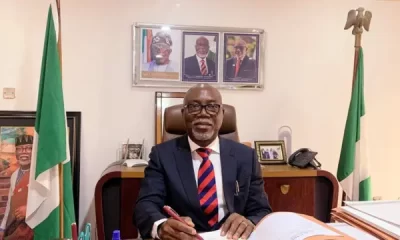
 Politics3 days ago
Politics3 days agoTribunal Dismisses PDP, Others’ Petitions Against Aiyedatiwa’s Election
-

 Politics3 days ago
Politics3 days agoDSS Seeks Court Injunction Against Publicity For Utomi’s Shadow Govt
-
Sports3 days ago
Tinubu Assures Kano Crash Survivors Of Rehabilitation
-
Rivers3 days ago
LG Administrator Commits To Completing Ongoing Projecrs … Urges Students Of The LGA To Be Focused
-
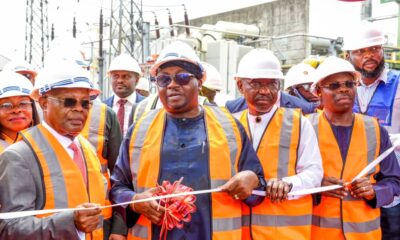
 Featured3 days ago
Featured3 days agoTinubu Commissions Afam 11 Power Plant …Urges Stronger Private Sector Partnership In Power Sector
-
News3 days ago
Former Petroleum Minister, Jibrin Aminu, Dies At 85
-
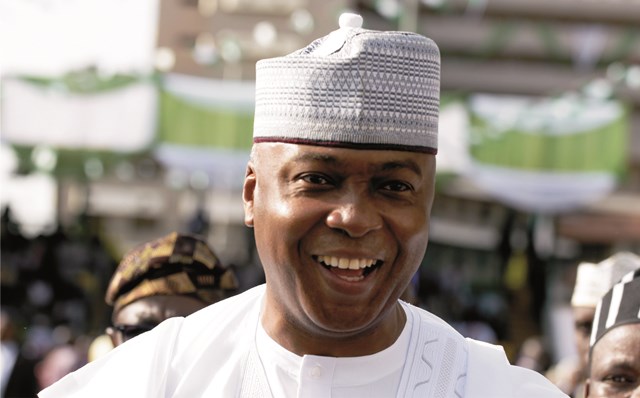
 Politics3 days ago
Politics3 days agoMore Members To Leave PDP – Saraki
-
Sports3 days ago
RSFCA Organises Refresher Seminar For Coaches


